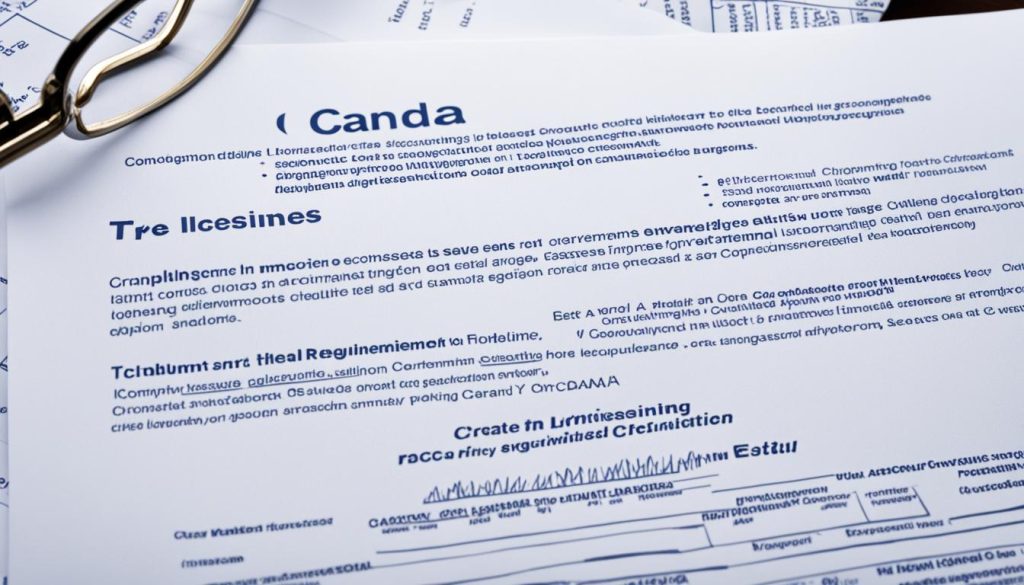Did you know that the real estate industry in Canada is currently experiencing a remarkable boom, with an unprecedented number of open positions available for aspiring real estate agents? These professionals, who serve as crucial business brokers in any real estate transaction, facilitate a wide range of activities, including residential and commercial property transactions, property management, urban planning services, real estate appraisal, and more. To officially become a real estate agent in Canada, individuals must complete a series of formalities, such as clearing exams, obtaining hands-on training and experience, and securing a license.
The real estate industry in Canada is currently booming, with many open positions available for real estate agents. These professionals are business brokers who act as important entities in any real estate transaction. They facilitate all kinds of real estate transactions, including residential properties, commercial properties, property management, urban planning services, real estate appraisal and salesperson appraisal services, and selling property of other possibilities. To officially become a real estate agent in Canada, individuals must complete certain formalities such as clearing exams, getting hands-on training and experience, and obtaining a license.
Introduction to Real Estate Career in Canada
As a real estate agent in Canada, your primary role will be to market your real estate services online via social media channels, communicate (in person or online) with potential buyers to see if they would be willing to hire you as their agent, listen to their requirements — their likes, dislikes, needs, style preferences, etc., and help them find a property that matches their specifications. You will also need to become an expert on your city, as your potential clients will ask you questions about everything – from the best neighbourhoods to the best property inspector/lawyer.
You will potentially need to show each client many properties all over town over the period of weeks and, sometimes, months, so patience will be crucial. The other part of the job entails meeting with those looking for an agent to list and sell their properties. This includes marketing yourself to the seller, putting a lockbox on the property, ordering a For listing the property on multiple listing service (MLS) and promoting the property via social media channels, accepting showing requests from other Realtors and Sign Calls from potential buyers who do not have a Realtor, reviewing and presenting offers to your clients, and helping them choose the best offer.
1. Roles and Responsibilities of a Real Estate Agent
As a real estate agent in Canada, your primary responsibilities will involve marketing your services, communicating with potential buyers, and assisting them in finding the perfect property that aligns with their preferences and needs. Additionally, you will need to become an expert on your local market, providing valuable insights to your clients.
2. Benefits of Becoming a Real Estate Agent
The benefits of becoming a real estate agent in Canada include the ability to set your own schedule, potential for high income, opportunities for growth and specialization, and the chance to help people achieve their homeownership dreams.
Eligibility Criteria for Real Estate Agents in Canada
To become a real estate agent in Canada, you must meet specific eligibility criteria. These requirements encompass key factors such as age, educational qualifications, and citizenship status.
1. Age Requirement
The minimum age to pursue a career as a real estate agent in Canada is typically 18 years old, although some provinces like Nova Scotia have a higher requirement of 19 years old.
2. Educational Qualification
In addition to meeting the age requirement, aspiring real estate agents in Canada must possess a high school diploma or its equivalent. Some provinces may have additional educational prerequisites, such as pre-application articling experience or preparatory coursework.
3. Citizenship Status
To be eligible to work as a real estate agent in Canada, you must be a Canadian citizen or a permanent resident. The citizenship status requirement ensures that real estate professionals have a deep understanding of the local market and are equipped to navigate the nuances of the Canadian real estate landscape.
It’s important to note that the specific eligibility criteria for real estate agents in Canada can vary across different provinces and territories. Aspiring real estate professionals should familiarize themselves with the unique requirements of their respective jurisdictions to ensure a smooth transition into the industry.

Step 1: Begin Your Real Estate Certification
The first step in becoming a real estate agent in Canada is to successfully complete the basic real estate licensing course in your province. Each province administers its own real estate pre-licensing courses through sanctioned real estate councils or association boards. For instance, British Columbia provides real estate education through UBC Sauder’s Real Estate Division, while Manitoba offers training through the Manitoba Real Estate Association (MREA).
Pre-Licensing Courses
You will need to choose your specialization — residential, commercial or rural — or you can choose them all if you want to become a real estate broker one day. While education requirements, institutes and real estate course providers in canada by province vary between provinces, the basic real estate licensing requirements appear to be fairly consistent across Canada.
Course Providers in Different Provinces
British Columbia, for example, offers real estate education through UBC Sauder’s Real Estate Division, while Manitoba provides training through the Manitoba Real Estate Association (MREA). The specific course providers and curriculum may differ, but the core licensing requirements tend to be similar nationwide.
Step 2: Take the Licensing Exam
After completing the required real estate licensing courses, the next step is to take the written licensing exam for each designation you choose (residential, commercial and/or rural). Licensure varies across provinces, but most require passing a written exam to receive your real estate license. If you choose all three designations, you’ll need to write three exams on three different topics.
Exam Requirements
The real estate licensing exam requirements in Canada typically include passing a comprehensive written test that assesses your knowledge of real estate law, ethics, finance, and industry best practices. The exam format and passing score can vary by province, so it’s important to research the specific requirements in your jurisdiction.
Passing the Exam
Once you receive positive test results and pass the criminal record check (including fingerprinting), your application should be approved, and you’ll need to pay a licensing fee. In some provinces, you could also be required to become a member of a professional organization and pay applicable dues. Preparing thoroughly and familiarizing yourself with the how to pass real estate exam in canada can greatly increase your chances of successfully obtaining your real estate license.
Step 3: Find a Brokerage and Join One
After obtaining your real estate license, the next crucial step is to find a brokerage that will submit your license application. The right brokerage can make a significant difference in your success as a real estate agent in Canada. When evaluating potential brokerages, it’s important to consider various factors that align with your career goals and work style.
Importance of Finding the Right Brokerage
The brokerage you choose to work with will not only handle the administrative aspects of your real estate practice but also provide you with the necessary resources, support, and training to thrive in the industry. A well-suited brokerage can offer valuable mentorship, marketing assistance, and access to a robust network of industry professionals, all of which can contribute to your long-term success as a real estate agent in Canada.
Factors to Consider When Choosing a Brokerage
When choosing a real estate brokerage in Canada, it’s crucial to consider the following factors:
- Company culture and work environment: Evaluate the brokerage’s values, team dynamics, and overall atmosphere to ensure it aligns with your preferred work style.
- Brokerage fee structure: Understand the commission splits, transaction fees, and any other financial obligations to ensure the arrangement is financially viable for you.
- Management support and training: Assess the level of guidance, mentorship, and professional development opportunities the brokerage provides for its agents.
- Marketing and technology resources: Determine the brokerage’s capabilities in terms of marketing tools, digital platforms, and backend support for real estate transactions.
- Conveyancing and other services: Inquire about the brokerage’s in-house or affiliated services, such as conveyancing, to streamline the real estate process for your clients.
Since you’ll likely work with this agency for at least your first couple of years, it’s crucial to find one that fits your work habits and adheres to a reasonable fee structure. Many brokerages do not have office spaces for their agents and do not require you to be there in the office all the time, allowing you to work from your own home office, a coffee shop, or a library. However, if you join a real estate team, the team might have more rigid requirements on when you need to be in the office.
Step 4: Get Errors and Omissions Insurance
In order to become a fully licensed real estate agent in Canada, you’ll need to obtain real estate errors and omissions insurance through your province’s real estate association. This insurance will protect you against any mistakes, damage or other mishaps that might happen while on the job. The specific real estate errors and omissions insurance requirements may vary across different provinces and territories, so it’s important to check with your local regulatory body to ensure you meet all the necessary coverage criteria.
Errors and omissions insurance is a critical component of being a licensed real estate agent in Canada. It provides financial protection in the event that a client suffers a loss or damages due to your professional negligence or mistakes. This type of coverage can help cover legal fees, settlements, and other costs associated with liability claims, helping to safeguard your business and personal assets.
Obtaining the required real estate errors and omissions insurance is a crucial step in the process of becoming a fully licensed real estate agent in Canada. By investing in this important coverage, you can have peace of mind knowing that you are protected against potential risks inherent in the real estate profession.

Step 5: Sign Up for New Realtor Courses and Training
Once you’ve obtained your real estate license, it’s essential to sign up for new realtor training programs in Canada. These courses, provided by your brokerage, will equip you with hands-on training from experienced Realtors, helping you develop the necessary skills and knowledge to thrive in the industry.
1. Brokerage-Provided Courses
Your brokerage will likely offer a range of courses and workshops designed to enhance your real estate expertise. These programs may cover topics such as effective client communication, negotiation strategies, market analysis, and transaction management. Taking advantage of these learning opportunities will set you up for success as you build your career as a new Realtor.
2. Shadowing Experienced Realtors
Many brokerages also provide the opportunity to shadow experienced Realtors in Canada. This hands-on approach to learning allows you to observe seasoned professionals in action, gaining invaluable insights that can’t be replicated in a classroom setting. By shadowing, you’ll learn the nuances of client interactions, property showings, and the art of closing deals, ultimately equipping you with the practical experience needed to thrive in the real estate industry.
Investing in your professional development through new realtor training programs and shadowing experienced Realtors in Canada will give you a strong foundation for your real estate career. These learning experiences will not only help you develop essential skills but also provide you with the confidence and knowledge to deliver exceptional service to your clients.
How to Become a Real Estate Agent in Canada?
After completing your training and obtaining your license, it’s time to start getting your first clients. To do this, you’ll need to take advantage of the tools and resources provided by your real estate association. This includes gaining access to your local multiple listing service (MLS) portal to post properties online and purchasing lockboxes to provide easy access to your listed properties. You should also invest in basic advertising, such as business cards, a professional headshot, a functional website, and active social media accounts.
1. Marketing Your Services
When it comes to how to market real estate services in canada, it’s important to utilize various digital and traditional marketing channels. This can include creating a strong online presence through a professional website and active social media accounts, as well as investing in targeted advertising campaigns. Additionally, developing a portfolio of successful past transactions and client testimonials can help demonstrate your expertise and build trust with potential clients.
2. Building a Professional Network
Building a professional network as a real estate agent in canada is crucial for long-term success. Attend industry events, join local real estate associations, and connect with other agents, mortgage brokers, home inspectors, and other professionals in the industry. These relationships can lead to valuable referrals and collaborative opportunities that can help grow your business.
3. Community Engagement
Becoming an active member of your local community can also be an effective way to market your real estate services in canada. Attend chamber of commerce meetings, sponsor local events or sports teams, and get involved with community organizations. This not only helps you become known and trusted within the area, but it also provides opportunities to network and connect with potential clients who may be looking to buy or sell a home.
Relationship marketing is key in the real estate industry, as people are more likely to trust and work with an agent they know and like. By focusing on these strategies, you can build a strong foundation for your real estate career in Canada.

Choosing a Specialization in Real Estate
As a real estate agent in Canada, you can choose to specialize in different areas of the industry. The most common specializations are
residential real estate, where you help people buy and sell homes, and commercial real estate, where you focus on income-producing properties like office buildings, retail stores, and industrial parks. Other potential specializations include real estate appraisal, property development and management, real estate financing, and urban planning.
Regardless of your chosen specialization, it’s important to develop in-depth knowledge of the market, local economic trends, relevant regulations, and industry best practices.
1. Residential Real Estate
Residential real estate agents in Canada assist clients with buying, selling, or leasing residential properties, such as single-family homes, condominiums, townhouses, and multi-unit dwellings. This specialization requires a deep understanding of the local housing market, including pricing trends, neighborhood amenities, and homebuyer preferences. Residential agents must also be skilled in marketing, negotiation, and contract management to ensure successful transactions for their clients.
2. Commercial Real Estate
Commercial real estate agents in Canada focus on properties that generate income, such as office buildings, retail spaces, industrial parks, and investment properties. This specialization demands expertise in market analysis, financial modeling, and property valuation. Commercial agents must be adept at identifying lucrative investment opportunities, negotiating leases, and managing complex transactions involving multiple stakeholders.
3. Other Specializations
Beyond the residential and commercial sectors, real estate agents in Canada can also specialize in areas like real estate appraisal, property development and management, real estate financing, and urban planning. These specializations offer opportunities to apply specialized knowledge and skills, often in niche markets or with a focus on specific types of properties or services.
Continuing Education and Professional Development
Ongoing education and professional development are essential for real estate agents in Canada to stay current with industry trends and best practices. Many provinces and territories require real estate professionals to complete a Mandatory Continuing Education program to maintain their license. These programs typically involve attending workshops, seminars, and other training sessions on topics such as legal updates, market analysis, and client service.
Additionally, real estate agents should seek out other professional development opportunities, such as industry conferences, webinars, and specialized courses, to continually expand their knowledge and skills. By staying informed and continuously improving their expertise, real estate agents in Canada can better serve their clients and stay ahead of the competition.
Mandatory Continuing Education Programs
In order to renew their real estate license, agents in Canada must complete a set number of hours of Mandatory Continuing Education (MCE) programs each year. These programs are designed to ensure that real estate professionals remain up-to-date with the latest industry regulations, best practices, and market trends.
Workshops and Seminars
Beyond the required MCE programs, real estate agents in Canada can further enhance their professional development by attending various workshops and seminars. These events often cover a wide range of topics, such as effective negotiation strategies, marketing techniques, and client communication skills. Participating in these optional training opportunities can give agents a competitive edge and help them provide exceptional service to their clients.

| Mandatory Continuing Education for Real Estate Agents in Canada | Real Estate Professional Development Opportunities in Canada |
|---|---|
|
|
Tips for Success as a Real Estate Agent
As a real estate agent in Canada, developing strong time management skills is crucial to juggling multiple clients and transactions simultaneously. Effective communication skills, both with clients and other industry professionals, are also vital, as you’ll need to navigate complex negotiations and provide clear, transparent updates throughout the sales process.
1. Time Management
Successful real estate agents in Canada learn to prioritize their tasks, create detailed schedules, and utilize productivity tools to stay organized. Implementing efficient time management practices can help you maximize your productivity, minimize stress, and deliver exceptional service to your clients.
2. Communication Skills
Excellent communication skills are essential for real estate agents in Canada. You must be able to listen attentively to your clients’ needs, clearly explain complex real estate concepts, and effectively negotiate on their behalf. Maintaining transparent and frequent communication throughout the sales process can help build trust and foster long-lasting relationships with your clients.
3. Networking and Relationship Building
Developing a strong professional network and fostering meaningful relationships with clients, fellow Realtors, and members of the local community can greatly contribute to your long-term success as a real estate agent in Canada. Networking and relationship building can lead to valuable referrals and repeat business, expanding your client base and enhancing your market visibility.
Conclusion
Becoming a real estate agent in Canada requires completing a series of steps, including obtaining the necessary education and licensing, finding the right brokerage to work with, and continuously developing your skills and knowledge. By following the guidelines outlined in this article, aspiring real estate professionals can navigate the process and build a successful career in the thriving Canadian real estate market.
From obtaining your pre-licensing education to networking within the community, each step is essential in transforming your passion for real estate into a rewarding and lucrative profession. Whether your focus is on residential, commercial, or other specialized areas of the industry, the Canadian real estate market offers ample opportunities for those willing to put in the effort and dedication required to become a successful agent.
By staying up-to-date with industry trends, maintaining strong communication skills, and fostering a robust network of contacts, you can position yourself for long-term success as a real estate agent in Canada. The conclusion on how to become a real estate agent in Canada is that with the right mindset, education, and commitment, this career path can be a highly rewarding and fulfilling one.
FAQ
1. How many years does it take to become a real estate agent in Canada?
The time it takes to become a real estate agent in Canada can vary depending on the province and the individual’s prior experience and education. However, the typical timeline involves completing the required pre-licensing courses, passing the licensing exam, and finding a brokerage to work with, which can generally be done within 6 months to 1 year.
2. Is becoming a realtor worth it in Canada?
Becoming a realtor in Canada can be a rewarding career path with several benefits, including the ability to set your own schedule, the potential for high income, opportunities for growth and specialization, and the chance to help people achieve their homeownership dreams. However, the industry can also be highly competitive, and success often requires dedication, networking, and ongoing professional development.
3. Do realtors make money in Canada?
Yes, realtors in Canada can make a good living, but their income can vary significantly based on factors such as their experience, market conditions, and the type of properties they specialize in. Top-performing realtors in Canada can earn six-figure incomes, while those just starting out may have more modest earnings initially.
4. How much does a real estate agent make in Canada?
The average income for a real estate agent in Canada can range from around ,000 to 0,000 or more per year, depending on several factors. Experienced agents in high-demand markets, such as Toronto or Vancouver, tend to earn higher incomes, while those starting out or working in smaller markets may have lower earnings.
5. How much do the top 1% of realtors make in Canada?
The top 1% of realtors in Canada can earn exceptionally high incomes, with some of the highest-performing agents making over




